Module 2 Experiences Unit 1 I ' ve also entered lots of speaking competitions. 课件(64张)
文档属性
| 名称 | Module 2 Experiences Unit 1 I ' ve also entered lots of speaking competitions. 课件(64张) | 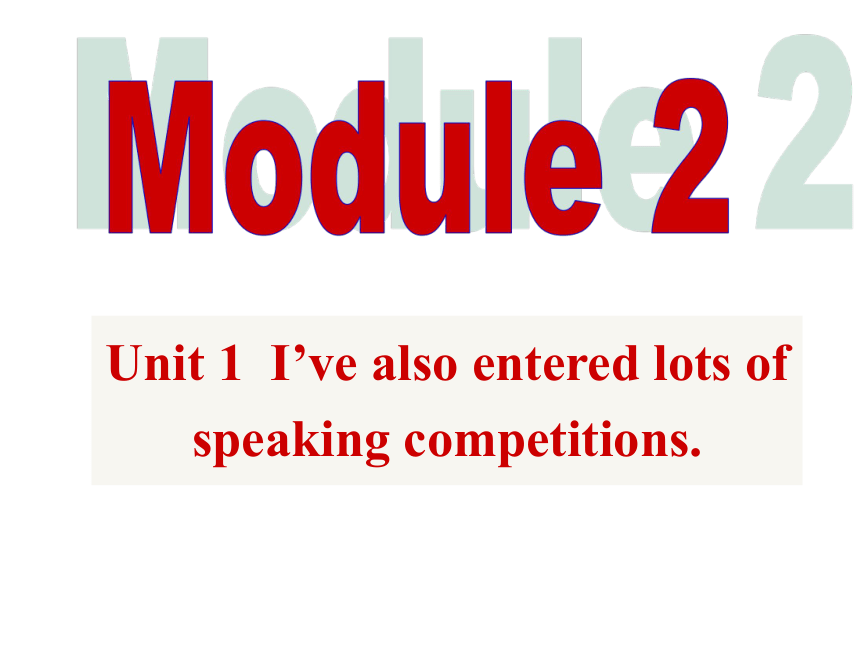 | |
| 格式 | zip | ||
| 文件大小 | 2.7MB | ||
| 资源类型 | 教案 | ||
| 版本资源 | 外研版 | ||
| 科目 | 英语 | ||
| 更新时间 | 2017-08-09 23:17:32 | ||
图片预览

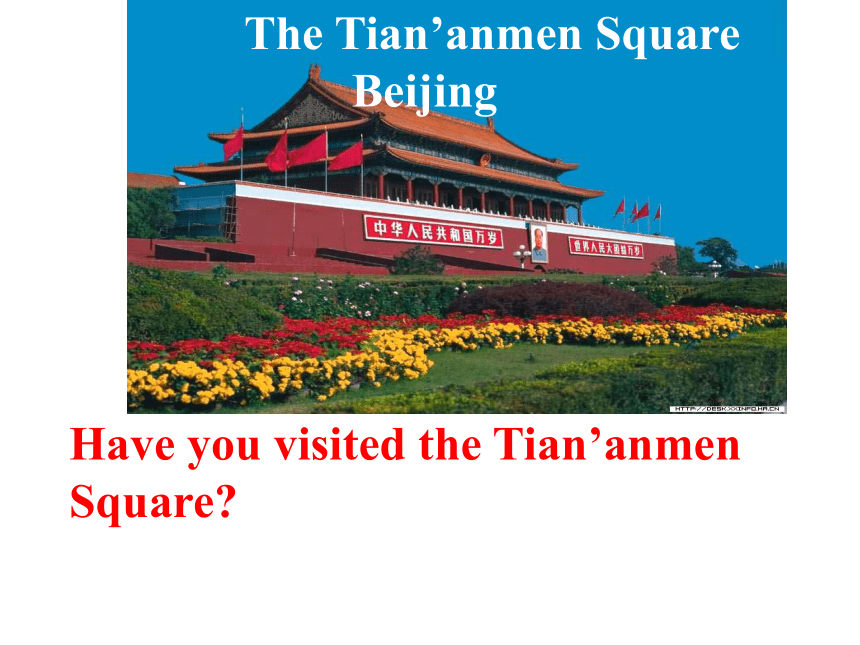



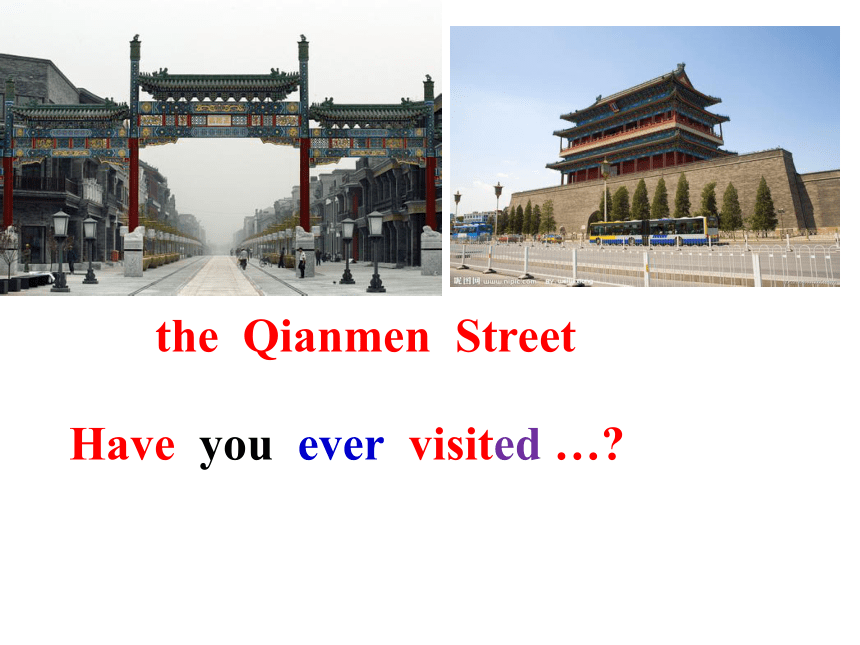


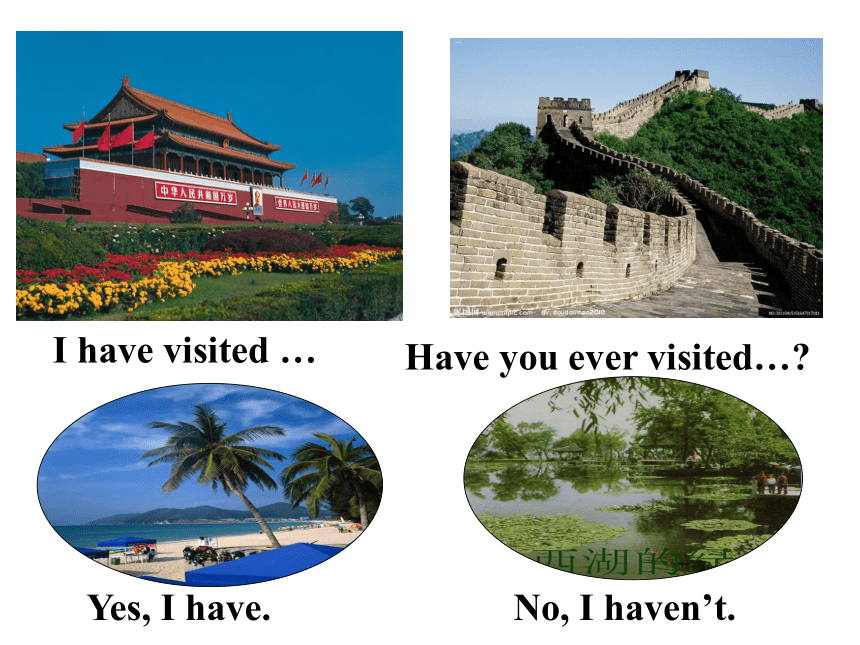
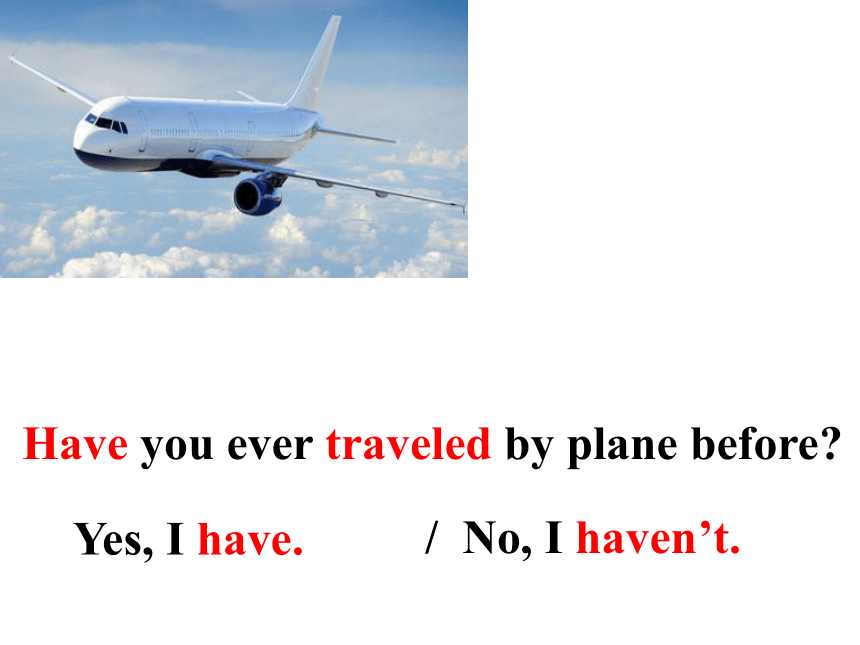
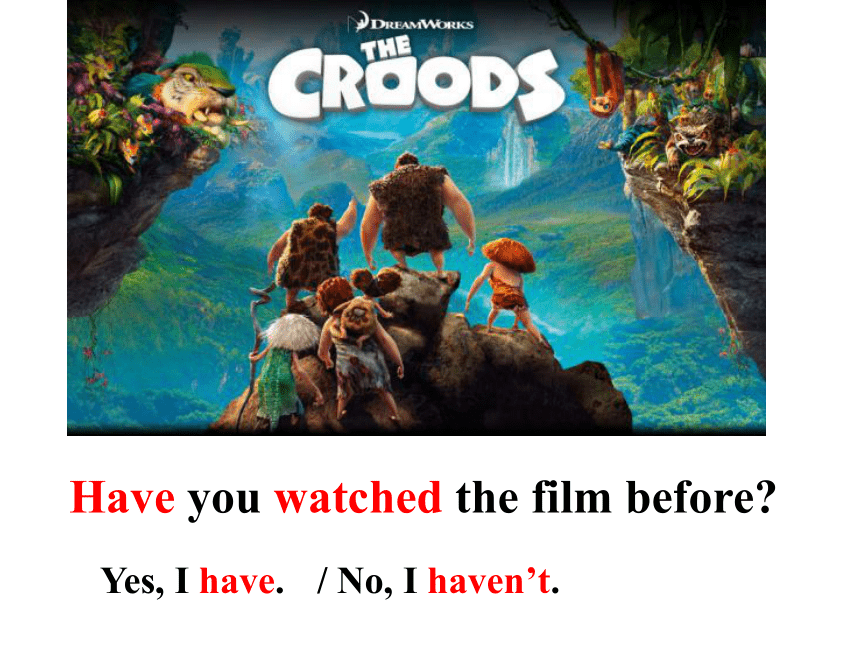
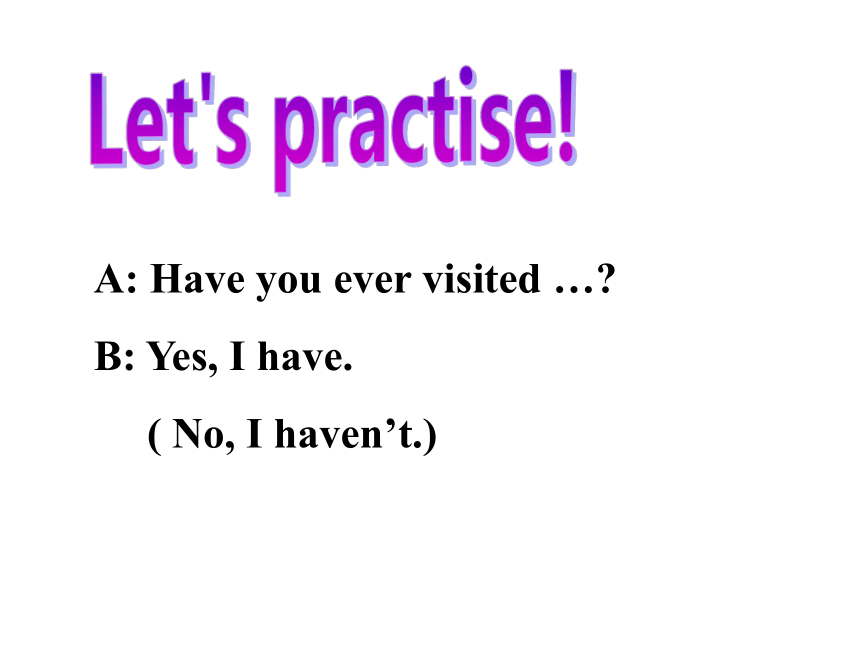
文档简介
课件64张PPT。Unit 1 I’ve also entered lots of speaking competitions. Module 2The Tian’anmen Square
BeijingHave you visited the Tian’anmen Square?
the Great WallHave you visited the Great Wall?
the Beihai ParkHave you visited …?
the Summer PalaceHave you ever visited …?
the Qianmen StreetHave you ever visited …?
the beachHave you ever visited …?
the West LakeHave you ever visited …?
I have visited … Have you ever visited…?Yes, I have.No, I haven’t.Have you ever traveled by plane before?Yes, I have./ No, I haven’t.Have you watched the film before?Yes, I have./ No, I haven’t.A: Have you ever visited …?
B: Yes, I have.
( No, I haven’t.)Let's practise!Warming upWhat’s this video about?It’s about a speaking competition.Did you see the speaking competition before?Yes, I did. / No, I didn’t.Are they entering the writing competition?Yes, they are.Are you interested in the speaking
competition?Yes, I am. / No, I am not. Have you ever entered ...?Chinese spelling competitioncompetition n. 比赛,竞赛prize n. 奖品,奖项first prizepity n. 可惜,遗憾Presentation12345Listen and number the words as you hear them.everexcitingtiredvisitwonderfulListen again and choose the correct answers.Lingling has visited / hasn’t ever visited the US.
Betty has asked / hasn’t asked her parents.
Lingling has travelled / hasn’t travelled by plane.Listen and discussWhat king of competition does Lingling enter?A speaking competition.Read and check what Lingling and Tony have or have not done.√√√√√2. Has Lingling ever won any prize of the competition before?
3. Why did Lingling always want to go on a dream holiday?No, she hasn’t.Because she can’t afford it. The plane tickets are too expensive.1. What’s the first prize of the competition?It’s “my dream holiday”.Read and answer4. Has Tony ever won any prizes of the competition before?
5. What’s the first prize of the writing competition?No, he hasn’t.The first prize is a book called Around the World 80 Days.—Has Lingling ever won any prizes before?
—No, she hasn’t.
—Has Tony entered lots of speaking
competitions?
—Yes, he has.Ask and answer questions about what Lingling and Tony have or have not done.Pair work Her _______ was to study at a good
university one day.
2. When I was in school, I won many ______
for my writing.
3. You must enter the music ___________!
You will beat everybody.afford competition dream invite pity prizeprizesdreamcompetitionComplete the sentences with the correct form of the words in the box.4. My family cannot ______ to buy a
ticket for the match.
5. It is a(n) _____ that you did not come
to see the film with us.
6. John ________ his new friends to his
birthday party last week.afford competition dream invite pity prizeaffordpityinvitedThe present perfect tense 现在完成时sb. + have / has + done(过去分词)
I have (not) visited China.
Have you visited China?
Yes, I have./ No, I haven’t.
He has (not) visited America.
Has he visited America?
Yes, he has./ No, he hasn’t.
Past participle(过去分词) 规则变化(发音)同过去式
A, clean—cleaned—cleaned
B, like—liked—liked play—played—played
C, stop—stopped—stopped
D, try—tried—tried
不规则变化
do—did—done be—was (were)—been
go—went—gone come—came—come
have—had—had fly—flew—flown 1. visit -- _______ 2. ask -- ______
3. travel -- _______ 4. enter -- _______
5. help -- _______ 6. win -- _____
7. want -- _______ 8. stop -- _______
9. think -- _______ 10. hope -- ______
11. invite -- _______ 12. call -- _______ Exercisesvisitedaskedtravelledenteredhelpedwonwantedstoppedthoughthopedinvitedcalled请写出下面动词的过去分词。Language points 1. … hasn’t ever visited the US. ever adv. 曾经;在任何时候;究竟;一直;永远
I don't think I ever met you. 我觉得我没见过你。
Have you ever been to Beijing? 你去过北京吗?
Nothing ever happens in this village. 这村里从来没有发生过什么事情。 Who ever can it be? 那究竟会是谁呢?
What ever is she doing? 她究竟在做什么?
They were very happy ever afterwards. 以后他们一直幸福地生活着。 2. … you will win a prize. win v. 赢;获胜;获得
He was confident that he would win.
他自信会获得胜利。
How can I win back her trust?
我怎样能重新赢得她的信任? win n. 胜利
The voters gave a narrow win to Vargas Llosa.
投票者使巴尔加斯·略萨险胜。 winner n. 获胜者 win和beat都可用作及物动词,作“赢”、“战胜”讲时,其区别主要在于宾语的不同:充当win的宾语的是比赛、战争、奖品、金钱等名词,即race,match, game, war,
?competition,prize之类的词;充当beat的宾语的则是比赛、竞争的对手,即指人或球队的名词或代词。如:[辨析] win, beat He won the first prize in the surfing competition.?
他在冲浪比赛中获得第一。
We beat the strongest team in the football match this time.
这次在足球赛中我们战胜了最强的那个队。1. Who do you think will ________ the next election?
2. The athlete _______ his competitors and _______ the gold medal.
3. Last week our school _____ their school in football match.winbeatPractice wonbeat3. The first prize is the holiday of your dreams in England. ?头等奖是你梦想的到英国度假。 dream作名词, 是可数名词, 意为“梦想;梦”。如: I had some very strange dreams last night.
昨晚我做了很奇怪的梦。
My son's dream is to be an astronaut.
我儿子的理想是当宇航员。 dream还可作动词, 常见用法如下:
(1) dream of / about sth. 意为“梦见/梦想某事”。
(2) dream of / about doing sth. 意为“梦见/ 梦想做某事”。
(3) dream + that从句。 When you go to sleep, what do you dream about?
当你睡觉时, 你梦到什么了?[注意]
dream的过去式为dreamed或dreamt, 过去分词为dreamed或dreamt。 He dreams of one day becoming a famous violinist.
他梦想有朝一日成为著名的小提琴家。
I never dreamed that I should see you again.
我从来没有想过会再次见到你。 4. But I can’t afford it. afford v. 提供, 供应得起, 给予
They walked because they couldn't afford (to take) a taxi.
他们因为坐不起计程车而步行。
These trees afford a pleasant shade.
这些树提供了荫凉。
I'd love to go on holiday but I can't afford the time.
我倒想去度假, 可是抽不出时间来。 afford的用法:
(1) afford(担负得起)通常要与 can, be able to 连用。
误: He doesn’t afford (to have) a car.
正: He can’t afford (to have) a car.
他买不起小汽车。
(2) 在现代英语中 afford(负担得起)不用于被动语态。
误: Such things can be afforded by many people.
正: Many people can afford such things.
那样的东西许多人可以买得起。 (3) afford(负担得起)可用于金钱方面(用于 afford to buy 之类 的),但通常不直接以 money 为宾语。
误: I want to get my car repaired because I can’t afford the money for a new one.
正: I want to get my car repaired because I can’t afford (to buy) a new one.
我想请人把车子修一下, 因为我买不起新的。 (4) afford(提供)可接双宾语(直接宾语通常为抽象概念),若双宾语易位,要用介词 to。注意: afford 表示“提供”时, 无需 与 can, be able to 连用。
误: Television affords pleasure for us.
正: Television affords pleasure to us.
电视给我们以快乐。5. I’ve stopped trying now stop doing sth. 停止做某事
stop to do sth. 停下来去做某事 The two girls stopped talking when they saw me.
那两个女孩一见到我就停止了讲话。
The two girls stopped to talk to me when they saw me.
这两个女孩一看到我就停下来和我讲话。1) We are tired. Let’s stop _______ a rest.
我们累了,我们停下来歇会儿吧。
2) “Stop _______, please. Let’s sing an English song,” said the teacher.
“不要说话了,让我们唱支英文歌曲吧。”老师说。
3) When the teacher came in, the students stopped _______; when the teacher went out, the students stopped ________.
老师走进来时,学生们停止说话;老师走出去时,学生们又停下来开始说话了。 to havetalkingtalkingto talkPractice 6. You can make it up. make?up:??????????????? (1)?编造,虚构??
The student made up an excuse for his being late.
那个学生为迟到编造了一个借口。
Their father is good at making up bed time stories.
他们的父亲很擅长睡觉前编些故事讲给他们听。
He asked us each to make up a dialogue.
他让我们每人编一段对话。 (2)?组成,形成 Six women and nineteen men make up the committee.
六位妇女和十九位男人组成了委员会。
They make up one-third of the province’s population.
他们占全省人口的三分之一。
Make up sentences with the words given.
用所给的词组成句子。 (3)化装,打扮
The girl made up her face carefully before going to meet James.
这姑娘在与詹姆斯会面之前,精心地化装了一番。?
It took her more than an hour to make herself up.
她花了一个多小时才打扮好。? (4)?补偿,弥补?? She’s making up for all the playing she missed.
她在弥补她过去失去的所有玩耍的机会。?
They?have?made?up?for?the?loss.?
他们已弥补了损失。
I have not worked this term, but I will make up for it next term.?
这学期我没干什么,不过我要在下学期弥补上。?Match the words with their meanings.afford competition dream invite pity prize1. ________ a group of thoughts, ideas or feelings happening in your mind when you go to sleep.
_______ be able to buy or pay for, be rich enough to buy, have enough to spare.
_______ sympathy for sb's suffering or unhappiness dreamaffordpity4. ____________ a test of ability or skill, we usually see it on television, in newspaper or at our school.
5. ____________ request presence or participation of; ask for request, especially politely or formally
6. ________ something that given to you when you are successful in a game or a competitioncompetitioninviteprizeThen complete Activity 5.Ask and answer questions about what Lingling and Tony have or haven’t done.--- Has Lingling ever won any prizes before?--- No, she hasn’t.For example:现在完成时 (I) 现在完成时用来表示过去已发生或完成的动作或状态, 其结果和现在有联系;也可表示持续到现在的动作或状态。现在让我们一起来了解现在完成时。◆肯定式:主语+助动词have / has +过去分词+其它。如:
They have spent all their money, so they have to walk home.
他们把所有的钱都花光了,只好步行回家。
[注意]
这里的have / has是助动词, 没有具体意义。当主语是第三人称单数时, 助动词用has, 其余人称用have。1. 句式结构:◆否定式:主语+助动词have / has +not +过去分词+其它。如:
She hasn’t travelled on a train yet. 她还未坐过火车旅行。
[注意]
have not, has not的缩略式分别为haven’t, hasn’t。◆一般疑问式: 助动词Have / Has +主语+过去分词+其它? 如:
—Have you ever made dumplings? ???? 你曾包过饺子吗?
—Yes, I have. ???? 是的,我包过。[注意]
把陈述句中的have或has放到句首, 句末用问号, 同时把句中的some, already改为any, yet就构成了一般疑问句。肯定回答用“Yes, 主语+ have / has.”;否定回答用“No, 主语+ haven’t / hasn’t.” ,也可以用"No, not yet. / No, never." 等。2. 基本用法: 现在完成时表示过去发生的某个动作对现在造成的影响或结果,着眼点是现在,还可以表示到目前为止曾经经历过或没有经历过的事情,常与ever, never等连用。如:I have been to New York. I don’t want to go there again this summer.
我去过纽约,这个暑假我不想再去了。
—Have you received his letter?
你收到他的信了吗?
—Yes, I have. / No, I haven’t.
是的,我收到了。/不,我没有。
Have you ever tried western food?
你吃过西餐吗?3. 过去分词的构成:规则动词 ???? ①动词后加-ed, 如:
work —worked, cook —cooked。
②以e结尾的动词加-d, 如:
live —lived, like —liked。
③以“辅音字母+y”结尾的动词将y改为i再加-ed, 如:
try —tried, carry —carried。
④末尾只有一个辅音字母的重读闭音节词,先双写这个辅音字母,再加-ed,如: stop —stopped, drop —dropped。(2)不规则动词 ???? 不规则动词的过去分词形式需要特殊记忆, 如:
see —seen, be —been, take —takenRead and predict which words the speaker is likely to stress. Then, listen and check.Read in roles and say aloud the words the speaker stresses.--- Have you ever wanted to travel around the world?
--- Yes, I have. I’ve always wanted to travel around the world.
--- Have you ever visited New York?
--- No, I haven’t. I’ve never visited the US.
--- Have you ever entered a competition?
--- No, I haven’t. I haven’t entered any competitions.Work in pairs Ask and answer questions.Task 1 Make a questionnaire.A: Have you ever wanted to travel around the world?
B: Yes, I have./ No, I haven’t.…written a book
…gone to a rock concert
…eaten foreign food
…read a book in English
…swum in the sea
… cooked a western meal
…been to USA
… won a prize in a competitionTask 2 Make a dialogue假设你的笔友今年暑假第一次来北京参观,你作为导游带他参观北京。请仿照Activity 6对话的形式,询问他在北京想做的事情,并给他提供一些帮助。 参考句型和词汇:
Have you ever watched the DVD about China?
Yes, I have.
visit many places
eat Chinese food
roast duck
It sounds brilliant!
make a travel plan
BeijingHave you visited the Tian’anmen Square?
the Great WallHave you visited the Great Wall?
the Beihai ParkHave you visited …?
the Summer PalaceHave you ever visited …?
the Qianmen StreetHave you ever visited …?
the beachHave you ever visited …?
the West LakeHave you ever visited …?
I have visited … Have you ever visited…?Yes, I have.No, I haven’t.Have you ever traveled by plane before?Yes, I have./ No, I haven’t.Have you watched the film before?Yes, I have./ No, I haven’t.A: Have you ever visited …?
B: Yes, I have.
( No, I haven’t.)Let's practise!Warming upWhat’s this video about?It’s about a speaking competition.Did you see the speaking competition before?Yes, I did. / No, I didn’t.Are they entering the writing competition?Yes, they are.Are you interested in the speaking
competition?Yes, I am. / No, I am not. Have you ever entered ...?Chinese spelling competitioncompetition n. 比赛,竞赛prize n. 奖品,奖项first prizepity n. 可惜,遗憾Presentation12345Listen and number the words as you hear them.everexcitingtiredvisitwonderfulListen again and choose the correct answers.Lingling has visited / hasn’t ever visited the US.
Betty has asked / hasn’t asked her parents.
Lingling has travelled / hasn’t travelled by plane.Listen and discussWhat king of competition does Lingling enter?A speaking competition.Read and check what Lingling and Tony have or have not done.√√√√√2. Has Lingling ever won any prize of the competition before?
3. Why did Lingling always want to go on a dream holiday?No, she hasn’t.Because she can’t afford it. The plane tickets are too expensive.1. What’s the first prize of the competition?It’s “my dream holiday”.Read and answer4. Has Tony ever won any prizes of the competition before?
5. What’s the first prize of the writing competition?No, he hasn’t.The first prize is a book called Around the World 80 Days.—Has Lingling ever won any prizes before?
—No, she hasn’t.
—Has Tony entered lots of speaking
competitions?
—Yes, he has.Ask and answer questions about what Lingling and Tony have or have not done.Pair work Her _______ was to study at a good
university one day.
2. When I was in school, I won many ______
for my writing.
3. You must enter the music ___________!
You will beat everybody.afford competition dream invite pity prizeprizesdreamcompetitionComplete the sentences with the correct form of the words in the box.4. My family cannot ______ to buy a
ticket for the match.
5. It is a(n) _____ that you did not come
to see the film with us.
6. John ________ his new friends to his
birthday party last week.afford competition dream invite pity prizeaffordpityinvitedThe present perfect tense 现在完成时sb. + have / has + done(过去分词)
I have (not) visited China.
Have you visited China?
Yes, I have./ No, I haven’t.
He has (not) visited America.
Has he visited America?
Yes, he has./ No, he hasn’t.
Past participle(过去分词) 规则变化(发音)同过去式
A, clean—cleaned—cleaned
B, like—liked—liked play—played—played
C, stop—stopped—stopped
D, try—tried—tried
不规则变化
do—did—done be—was (were)—been
go—went—gone come—came—come
have—had—had fly—flew—flown 1. visit -- _______ 2. ask -- ______
3. travel -- _______ 4. enter -- _______
5. help -- _______ 6. win -- _____
7. want -- _______ 8. stop -- _______
9. think -- _______ 10. hope -- ______
11. invite -- _______ 12. call -- _______ Exercisesvisitedaskedtravelledenteredhelpedwonwantedstoppedthoughthopedinvitedcalled请写出下面动词的过去分词。Language points 1. … hasn’t ever visited the US. ever adv. 曾经;在任何时候;究竟;一直;永远
I don't think I ever met you. 我觉得我没见过你。
Have you ever been to Beijing? 你去过北京吗?
Nothing ever happens in this village. 这村里从来没有发生过什么事情。 Who ever can it be? 那究竟会是谁呢?
What ever is she doing? 她究竟在做什么?
They were very happy ever afterwards. 以后他们一直幸福地生活着。 2. … you will win a prize. win v. 赢;获胜;获得
He was confident that he would win.
他自信会获得胜利。
How can I win back her trust?
我怎样能重新赢得她的信任? win n. 胜利
The voters gave a narrow win to Vargas Llosa.
投票者使巴尔加斯·略萨险胜。 winner n. 获胜者 win和beat都可用作及物动词,作“赢”、“战胜”讲时,其区别主要在于宾语的不同:充当win的宾语的是比赛、战争、奖品、金钱等名词,即race,match, game, war,
?competition,prize之类的词;充当beat的宾语的则是比赛、竞争的对手,即指人或球队的名词或代词。如:[辨析] win, beat He won the first prize in the surfing competition.?
他在冲浪比赛中获得第一。
We beat the strongest team in the football match this time.
这次在足球赛中我们战胜了最强的那个队。1. Who do you think will ________ the next election?
2. The athlete _______ his competitors and _______ the gold medal.
3. Last week our school _____ their school in football match.winbeatPractice wonbeat3. The first prize is the holiday of your dreams in England. ?头等奖是你梦想的到英国度假。 dream作名词, 是可数名词, 意为“梦想;梦”。如: I had some very strange dreams last night.
昨晚我做了很奇怪的梦。
My son's dream is to be an astronaut.
我儿子的理想是当宇航员。 dream还可作动词, 常见用法如下:
(1) dream of / about sth. 意为“梦见/梦想某事”。
(2) dream of / about doing sth. 意为“梦见/ 梦想做某事”。
(3) dream + that从句。 When you go to sleep, what do you dream about?
当你睡觉时, 你梦到什么了?[注意]
dream的过去式为dreamed或dreamt, 过去分词为dreamed或dreamt。 He dreams of one day becoming a famous violinist.
他梦想有朝一日成为著名的小提琴家。
I never dreamed that I should see you again.
我从来没有想过会再次见到你。 4. But I can’t afford it. afford v. 提供, 供应得起, 给予
They walked because they couldn't afford (to take) a taxi.
他们因为坐不起计程车而步行。
These trees afford a pleasant shade.
这些树提供了荫凉。
I'd love to go on holiday but I can't afford the time.
我倒想去度假, 可是抽不出时间来。 afford的用法:
(1) afford(担负得起)通常要与 can, be able to 连用。
误: He doesn’t afford (to have) a car.
正: He can’t afford (to have) a car.
他买不起小汽车。
(2) 在现代英语中 afford(负担得起)不用于被动语态。
误: Such things can be afforded by many people.
正: Many people can afford such things.
那样的东西许多人可以买得起。 (3) afford(负担得起)可用于金钱方面(用于 afford to buy 之类 的),但通常不直接以 money 为宾语。
误: I want to get my car repaired because I can’t afford the money for a new one.
正: I want to get my car repaired because I can’t afford (to buy) a new one.
我想请人把车子修一下, 因为我买不起新的。 (4) afford(提供)可接双宾语(直接宾语通常为抽象概念),若双宾语易位,要用介词 to。注意: afford 表示“提供”时, 无需 与 can, be able to 连用。
误: Television affords pleasure for us.
正: Television affords pleasure to us.
电视给我们以快乐。5. I’ve stopped trying now stop doing sth. 停止做某事
stop to do sth. 停下来去做某事 The two girls stopped talking when they saw me.
那两个女孩一见到我就停止了讲话。
The two girls stopped to talk to me when they saw me.
这两个女孩一看到我就停下来和我讲话。1) We are tired. Let’s stop _______ a rest.
我们累了,我们停下来歇会儿吧。
2) “Stop _______, please. Let’s sing an English song,” said the teacher.
“不要说话了,让我们唱支英文歌曲吧。”老师说。
3) When the teacher came in, the students stopped _______; when the teacher went out, the students stopped ________.
老师走进来时,学生们停止说话;老师走出去时,学生们又停下来开始说话了。 to havetalkingtalkingto talkPractice 6. You can make it up. make?up:??????????????? (1)?编造,虚构??
The student made up an excuse for his being late.
那个学生为迟到编造了一个借口。
Their father is good at making up bed time stories.
他们的父亲很擅长睡觉前编些故事讲给他们听。
He asked us each to make up a dialogue.
他让我们每人编一段对话。 (2)?组成,形成 Six women and nineteen men make up the committee.
六位妇女和十九位男人组成了委员会。
They make up one-third of the province’s population.
他们占全省人口的三分之一。
Make up sentences with the words given.
用所给的词组成句子。 (3)化装,打扮
The girl made up her face carefully before going to meet James.
这姑娘在与詹姆斯会面之前,精心地化装了一番。?
It took her more than an hour to make herself up.
她花了一个多小时才打扮好。? (4)?补偿,弥补?? She’s making up for all the playing she missed.
她在弥补她过去失去的所有玩耍的机会。?
They?have?made?up?for?the?loss.?
他们已弥补了损失。
I have not worked this term, but I will make up for it next term.?
这学期我没干什么,不过我要在下学期弥补上。?Match the words with their meanings.afford competition dream invite pity prize1. ________ a group of thoughts, ideas or feelings happening in your mind when you go to sleep.
_______ be able to buy or pay for, be rich enough to buy, have enough to spare.
_______ sympathy for sb's suffering or unhappiness dreamaffordpity4. ____________ a test of ability or skill, we usually see it on television, in newspaper or at our school.
5. ____________ request presence or participation of; ask for request, especially politely or formally
6. ________ something that given to you when you are successful in a game or a competitioncompetitioninviteprizeThen complete Activity 5.Ask and answer questions about what Lingling and Tony have or haven’t done.--- Has Lingling ever won any prizes before?--- No, she hasn’t.For example:现在完成时 (I) 现在完成时用来表示过去已发生或完成的动作或状态, 其结果和现在有联系;也可表示持续到现在的动作或状态。现在让我们一起来了解现在完成时。◆肯定式:主语+助动词have / has +过去分词+其它。如:
They have spent all their money, so they have to walk home.
他们把所有的钱都花光了,只好步行回家。
[注意]
这里的have / has是助动词, 没有具体意义。当主语是第三人称单数时, 助动词用has, 其余人称用have。1. 句式结构:◆否定式:主语+助动词have / has +not +过去分词+其它。如:
She hasn’t travelled on a train yet. 她还未坐过火车旅行。
[注意]
have not, has not的缩略式分别为haven’t, hasn’t。◆一般疑问式: 助动词Have / Has +主语+过去分词+其它? 如:
—Have you ever made dumplings? ???? 你曾包过饺子吗?
—Yes, I have. ???? 是的,我包过。[注意]
把陈述句中的have或has放到句首, 句末用问号, 同时把句中的some, already改为any, yet就构成了一般疑问句。肯定回答用“Yes, 主语+ have / has.”;否定回答用“No, 主语+ haven’t / hasn’t.” ,也可以用"No, not yet. / No, never." 等。2. 基本用法: 现在完成时表示过去发生的某个动作对现在造成的影响或结果,着眼点是现在,还可以表示到目前为止曾经经历过或没有经历过的事情,常与ever, never等连用。如:I have been to New York. I don’t want to go there again this summer.
我去过纽约,这个暑假我不想再去了。
—Have you received his letter?
你收到他的信了吗?
—Yes, I have. / No, I haven’t.
是的,我收到了。/不,我没有。
Have you ever tried western food?
你吃过西餐吗?3. 过去分词的构成:规则动词 ???? ①动词后加-ed, 如:
work —worked, cook —cooked。
②以e结尾的动词加-d, 如:
live —lived, like —liked。
③以“辅音字母+y”结尾的动词将y改为i再加-ed, 如:
try —tried, carry —carried。
④末尾只有一个辅音字母的重读闭音节词,先双写这个辅音字母,再加-ed,如: stop —stopped, drop —dropped。(2)不规则动词 ???? 不规则动词的过去分词形式需要特殊记忆, 如:
see —seen, be —been, take —takenRead and predict which words the speaker is likely to stress. Then, listen and check.Read in roles and say aloud the words the speaker stresses.--- Have you ever wanted to travel around the world?
--- Yes, I have. I’ve always wanted to travel around the world.
--- Have you ever visited New York?
--- No, I haven’t. I’ve never visited the US.
--- Have you ever entered a competition?
--- No, I haven’t. I haven’t entered any competitions.Work in pairs Ask and answer questions.Task 1 Make a questionnaire.A: Have you ever wanted to travel around the world?
B: Yes, I have./ No, I haven’t.…written a book
…gone to a rock concert
…eaten foreign food
…read a book in English
…swum in the sea
… cooked a western meal
…been to USA
… won a prize in a competitionTask 2 Make a dialogue假设你的笔友今年暑假第一次来北京参观,你作为导游带他参观北京。请仿照Activity 6对话的形式,询问他在北京想做的事情,并给他提供一些帮助。 参考句型和词汇:
Have you ever watched the DVD about China?
Yes, I have.
visit many places
eat Chinese food
roast duck
It sounds brilliant!
make a travel plan
同课章节目录
- Module 1 Feelings and impressions
- Unit 1 It smells delicious.
- Unit 2 I feel nervous when I speak Chinese .
- Unit 3 Language in use
- Module 2 Experiences
- Unit 1 I've also entered lots of speaking competi
- Unit 2 They have seen the Pyramids.
- Unit 3 Language in use
- Module 3 Journey to space
- Unit 1 Has it arrived yet?
- Unit 2 We have not found life on any other planet
- Unit 3 Language in use
- Module 4 Seeing the docto
- Unit 1 I haven't done much exercise since I got m
- Unit 2 We have played football for a year now
- Unit 3 Language in use
- Module 5 Cartoons
- Unit 1 It's time to watch a cartoon.
- Unit 2 Tintin has been popular for over eighty yea
- Unit 3 Language in use
- Revision module A
- Module 6 Hobbies
- Unit 1 Do you collect anything ?
- Unit 2 Hobbies can make you grow as a person.
- Unit 3 Language in use
- Module 7 Summer in Los Angeles
- Unit 1 Please write to me and send me some photos
- Unit 2 Fill out a form and come to learn English
- Unit 3 Language in use
- Module 8 Time off
- Unit 1 I can hardly believe we are in the city ce
- Unit 2 We thought somebody was moving about
- Unit 3 Language in use
- Module 9 Friendship
- Unit 1 Could I ask if you've mentioned this to he
- Unit 2 I believe that the world is what you think
- Unit 3 Language in use
- Module 10 On the radio
- Unit 1 I hope that you can join us one day
- Unit 2 It seemed that they were speaking to me in
- Unit 3 Language in use
- Revision module B
